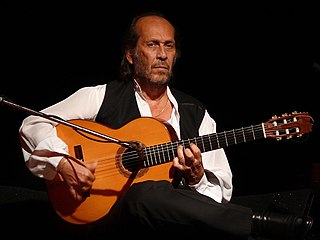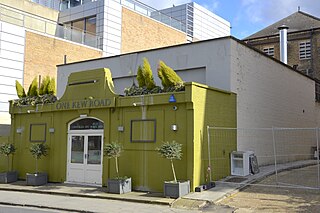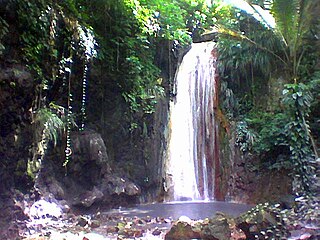
In music performances, rhythm guitar is a technique and role that performs a combination of two functions: to provide all or part of the rhythmic pulse in conjunction with other instruments from the rhythm section ; and to provide all or part of the harmony, i.e. the chords from a song's chord progression, where a chord is a group of notes played together. Therefore, the basic technique of rhythm guitar is to hold down a series of chords with the fretting hand while strumming or fingerpicking rhythmically with the other hand. More developed rhythm techniques include arpeggios, damping, riffs, chord solos, and complex strums.

Saint Lucia is an island country in the West Indies in the eastern Caribbean Sea on the boundary with the Atlantic Ocean. The island was previously called Iyonola, the name given to the island by the native Arawaks and later, Hewanorra, the name given by the native Caribs, two separate Amerindian peoples. Part of the Lesser Antilles, it is located north/northeast of the island of Saint Vincent, northwest of Barbados and south of Martinique. It covers a land area of 617 km2 and reported a population of 165,595 in the 2010 census. Soufrière was colonized by the French and was the original capital of the island. Its capital is Castries.

CBGB was a New York City music club opened in 1973 by Hilly Kristal in Manhattan's East Village. The club was previously a biker bar and before that was a dive bar. The letters CBGB were for Country, BlueGrass, and Blues, Kristal's original vision, yet CBGB soon became a famed venue of punk rock and new wave bands like the Ramones, Television, Patti Smith Group, Blondie, and Talking Heads. From the early 1980s onward, CBGB was known for hardcore punk.

Albert Laurence Di Meola is an American guitarist. Known for his works in jazz fusion and world music, he began his career as a guitarist of the group Return to Forever in 1974. Between the 1970s and 1980s, albums such as Elegant Gypsy and Friday Night in San Francisco earned him both critical and commercial success.

Vieux Fort is a district located in the southern part of Saint Lucia. Vieux Fort is also the name of the main town in the district. It is the home of the second-largest town on the island and is the home of Saint Lucia's international airport, Hewanorra International Airport.
The music of Saint Lucia is home to many vibrant oral and folk traditions and is based on elements derived from the music of Africa, especially rhythmically, and Western Europe, dances like the quadrille, polka and waltz. The banjo and cuatro are iconic Lucian folk instruments, especially a four-stringed banjo called the bwa poye. Celebratory songs called jwé show lyricism, and rhythmic complexity. The most important of the Afro-Lucian Creole folk dances is the kwadril. Music is an integral part of Lucian folk holidays and celebrations, as well as the good-natured rivalry between the La Rose and La Marguerite societies. There is little Western classical music on Saint Lucia, and the country's popular music industry is only nascent. There are few recording opportunities, though live music and radio remain a vital part of Lucian culture. Popular music from abroad, especially Trinidadian styles like calypso and soca, is widespread.

Francisco Gustavo Sánchez Gómez, known as Paco de Lucía, was a Spanish virtuoso flamenco guitarist, composer, and record producer. A leading proponent of the new flamenco style, he was one of the first flamenco guitarists to branch into classical and jazz. Richard Chapman and Eric Clapton, authors of Guitar: Music, History, Players, describe de Lucía as a "titanic figure in the world of flamenco guitar", and Dennis Koster, author of Guitar Atlas, Flamenco, has referred to de Lucía as "one of history's greatest guitarists".
The Rail Band is a Malian band formed in 1970; it was later known as Super Rail Band, Bamako Rail Band or, most comprehensively and formally, Super Rail Band of the Buffet Hotel de la Gare, Bamako. Its fame was built upon the mid-20th century craze for Latin — especially Cuban — jazz music which came out of Congo in the 1940s. The Rail Band was one of the first West African acts to combine this mature Afro-Latin sound with traditional instruments and styles. In their case, this was built upon the Mande Griot praise singer tradition, along with Bambara and other Malian and Guinean musical traditions. Their distinctive sound came from combining electric guitar and jazz horns with soaring Mandinka and Bamabara lyrical lines, African and western drums, and local instruments such as the kora and the balafon. At their height of fame in the 1970s, the Rail Band played to sold-out venues and even stadia across West Africa, and launched solo careers for many of its members, including the legendary vocalist Salif Keita.

Larry Coryell was an American jazz guitarist.

The Five Spot Café was a jazz club located at 5 Cooper Square (1956–1962) in the Bowery neighborhood of New York City, between the East and West Village. In 1962, it moved to 2 St. Marks Place, until closing in 1967. Its friendly, non-commercial, low-key atmosphere, with affordable drinks and food, and cutting edge bebop and progressive jazz attracted a host of avant-garde artists and writers. It was a venue of historic significance as well, a Mecca for musicians, both local and out-of-state, who packed the small venue to listen to many of the most creative composers and performers of the era.

Saint-Germain-des-Prés is one of the four administrative quarters of the 6th arrondissement of Paris, France, located around the church of the former Abbey of Saint-Germain-des-Prés. Its official borders are the River Seine on the north, the rue des Saints-Pères on the west, between the rue de Seine and rue Mazarine on the east, and the rue du Four on the south. Residents of the quarter are known as Germanopratins.

Although traditional jazz has had a sizeable following for a long time in India, with the yearly Jazz Yatra festivals and the frequent collaboration between Indian classical and Western jazz musicians, the interest in the blues has more or less been incidental due to the shared ancestry with jazz. Nonetheless, there have been a few musicians who stay true to the genre. They have not only helped define, promote and keep the blues alive in India, but have also developed a very Indian flavour of this music form.

The Crawdaddy Club was a music venue in Richmond, Surrey, England, which opened in 1963. The Rolling Stones were its house band in its first year and were followed by The Yardbirds. Several other notable British blues and rhythm and blues acts also played there.

Zyryab is a 1990 album by flamenco guitarist Paco de Lucía and his sextet. It features jazz pianist Chick Corea and guitarist Manolo Sanlúcar. The album is named after Ziryab, a 9th-century, Persian and poet/musician at the Umayyad court in Córdoba, credited with introducing to Spain the Arabic oud, later to become the Spanish guitar.
Tar Babies was an American band from Madison, Wisconsin, United States, that released several albums on SST Records. Critic Steve Huey of Allmusic describes them as a minor player on SST, with an intriguing sound rooted in hardcore punk but touching on "bits of psychedelia, jazz, and avant-noise skronk" and open-ended jamming reminiscent of George Clinton's P-Funk groups.

Bola Sete was a Brazilian guitarist. Sete played jazz with Vince Guaraldi and Dizzy Gillespie.
The Quintette du Hot Club de France, often abbreviated "QdHCdF" or "QHCF", was a jazz group founded in France in 1934 by guitarist Django Reinhardt and violinist Stéphane Grappelli and active in one form or another until 1948.

An organ trio is a form of jazz ensemble consisting of three musicians; a Hammond organ player, a drummer, and either a jazz guitarist or a saxophone player. In some cases the saxophonist will join a trio which consists of an organist, guitarist, and drummer, making it a quartet. Organ trios were a popular type of jazz ensemble for club and bar settings in the 1950s and 1960s, performing a blues-based style of jazz that incorporated elements of R&B. The organ trio format was characterized by long improvised solos and an exploration of different musical "moods".
Ronald "Boo" Hinkson is a guitarist from Saint Lucia who combines jazz with soca music (Caribbean). He started his career by forming the band Tru Tones. His mother plays the guitar, and she was his first teacher. He has been praised by guitarists George Benson and Stanley Jordan. In 2016 he became the first person from Saint Lucia to be a judge at the Grammy Awards.

Soufrière Estate, located on the Caribbean island of Saint Lucia, was originally established in 1713 as a 2,000-acre (8.1 km2) estate granted to three Devaux brothers for services to King Louis XIV of France. Later on, mineral springs were discovered and were used as restorative baths by the French soldiers. In 1784, the Baron de Laborie, the French Governor of St Lucia, sent samples of the water to Paris for testing and it is believed to be good for rheumatism and skin complaints.














